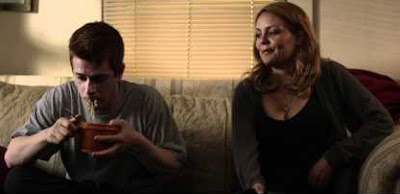TrustMovies has tried (and generally succeeded, he thinks) to embrace all kinds of hybrid documentaries -- from Alma Ha'rel's Bombay Beach to the recent Imposter of Bart Layton. These movies work because, for all their odd couplings of disparate elements, they finally succeed in shedding some real light on their subjects. Ms Morley manages to obscure hers by turning it into a half-narrative, half talking-head doc, in which one side routs the other. If ever a tale cried out for an honest, imaginative, narrative re-telling of a woman and an event (think of Miranda Richardson in Mike Newell's and Shelagh Delaney's Dance With a Stranger), it's this one. Instead, it receives a tentative, pussy-footing account that contradicts itself and leaves an intelligent viewer very nearly frothing at the mouth.
Two years ago Ms Morley wrote and directed a full-length narrative film (that was not much seen, evidently), so she has some experience in this field. Instead she chooses to use a quite beautiful young actress, Zawe Ashton (at left, and more beautiful by far than the actual Ms Vincent) yet gives her little to do but pose and look pensive. The talking heads go on and on about Vincent and what she did and didn't do and maybe did and did not feel until we want to scream, "For god's sake show us!" And then we get more pensive posing.
 Elsewhere, too, I suspect that things were staged to resemble what was found in the Vincent flat, once authorities had entered it -- the dirty dishes in the sink, above, and the cobwebby radio, below. These are fine, for we're now used to this kind of re-creation. But it is where the human being is concerned that we demand some meat on the bones.
Elsewhere, too, I suspect that things were staged to resemble what was found in the Vincent flat, once authorities had entered it -- the dirty dishes in the sink, above, and the cobwebby radio, below. These are fine, for we're now used to this kind of re-creation. But it is where the human being is concerned that we demand some meat on the bones.Not only do we not learn know much about Joyce, who remains amorphous throughout, even the event that put her in the news, post demise, gets short shrift. Some investigative reporting as to how this was allowed to happen -- something more than a repetition of a few of the known facts -- would have been appreciated. Instead we get more of those talking heads, as Joyce's friends and/or maybe lovers, speak up about what she meant to them.
The most interesting and in some ways the saddest of these is her would-be boyfriend, below, who repeatedly tells us how shockingly lucky he was to have won someone like Joyce. Maybe; maybe not. The filmmaker seems so intent on exploring her subject as a stand-in for "the lonely life" that we leave the theater imagining that she barely had one. Which fits right into the movie's title and the film-maker's take on the whole thing. Yet Ms Vincent had a life, such as it was, but it's something we don't come within a mile of reaching.
Maybe someone is preparing a screenplay right now for the likes of Thandie Newton, Megan Echikunwoke, Ms Ashton -- or any of the fine young black or mixed-race actresses who, with a decent script in front of them, might bring to life this sad, strange woman. Dreams of A Life, from Strand Releasing and 95 minutes long, opens this Friday in New York City at the IFC Center. I'll try to find where else is might be playing. Check back later....



















































